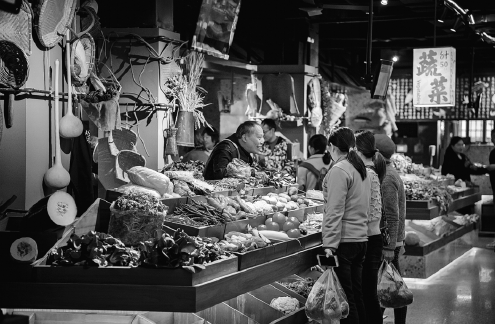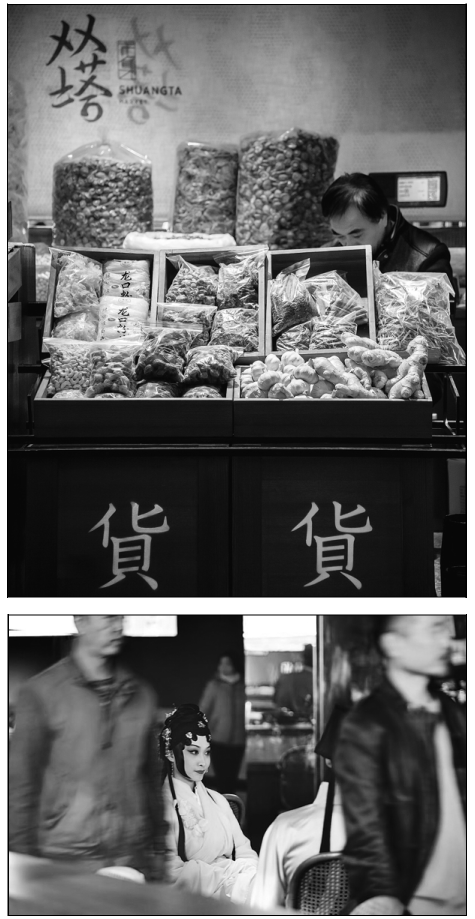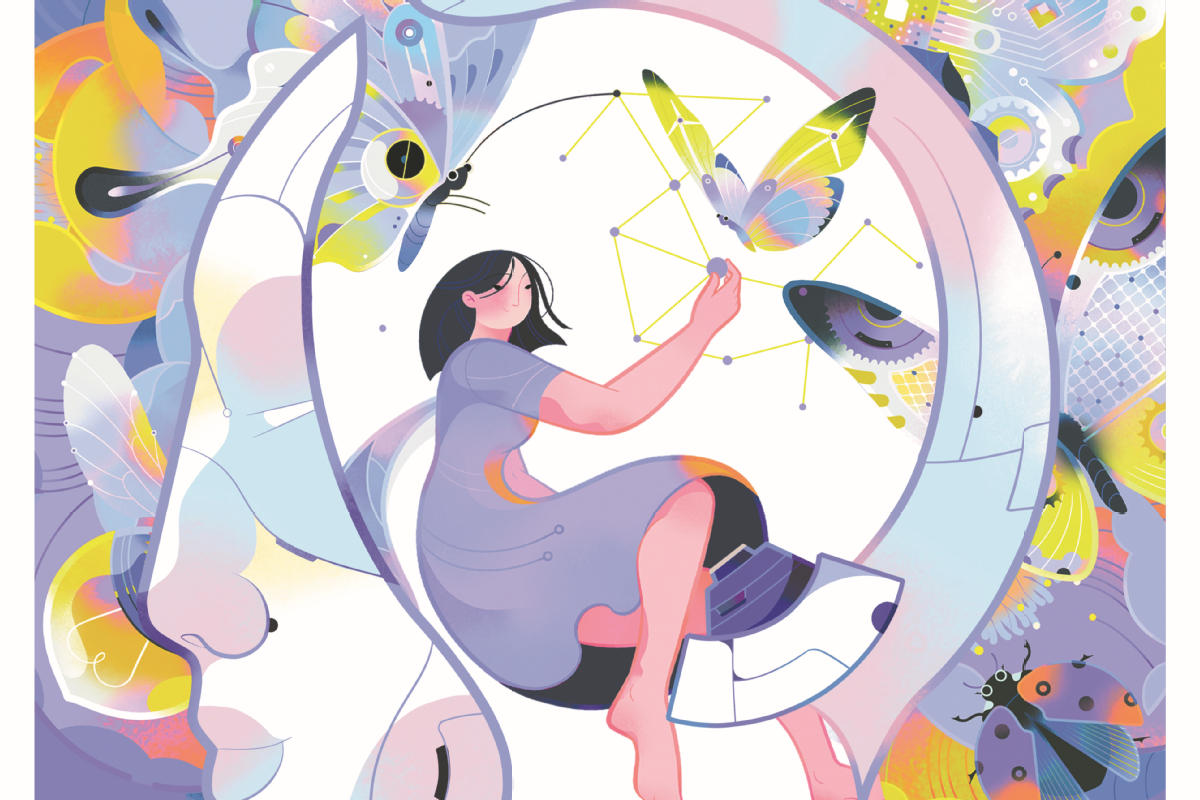Market update
More than just a place to shop for daily necessities, the recently renovated Shuangta Market in Suzhu has introduced new inclusive elements and is set to become a thriving hub.

A large logo with the Chinese characters shuang ta (double towers) on one side of the entrance gate is what first catches the eyes of visitors. The renovated Shuangta Market in Suzhu, Jiangsu province, formerly a traditional farmers' market, reopened to the public on Dec 17 and provides a slice of the unique and faded Jiangnan (south bank of the Yangtze) vibe amid the city's busy traffic and modern skyline.
Back in the day, the Jiangnan region used to be the favored haunt of the Chinese literati. Suzhou, in particular, boasts scenery comprised of elegant, exquisite waters and traditional buildings with their white walls and gray stone tiled roofs. The city government has been trying for many years to balance the conurbation's development on the pillar of its ancient elegance.
Inspired by the ancient Suzhou numerals, also known as Suzhou mazi, a numeral system used in China before the introduction of Hindu numerals, and applied to private notes and accounts, the artistic design of the shuang ta logo, exudes Suzhou's authentic flavor and charm. The word shi ji (market) is engraved in the shape of a red seal, providing a backdrop against which many visitors like to take pictures.
In recent years, traditional farmers' markets across the country, which usually only sell fresh produce, are being transformed to meet China's tougher food sanitary standards and the newly-renovated Shuangta Market covers an area of nearly 2,000 square meters. It not only serves as a hub for purchasing daily necessities, but also as a space that integrates life into art, allowing residents of surrounding neighborhoods to check off items on their grocery list and to while away a pleasant few hours.
The interior decoration of the market has retained many old Suzhou elements, like straw rain capes, rice wine tanks, fish baskets and agricultural tools.
"When you come to the Shuangta Market, you can go to the eateries while watching art performances, and drink a cup of coffee whiling reading a book. This will completely overturn the traditional positioning of the farmers' market and become the best presentation of a mashup of market functions," says Zhang Jie, deputy director of Gusu district's economy and technology bureau.
The city's decision-makers are learning to grapple with the balance between the old and new on the premise of maintaining a clean and orderly city, and their effort in turn helps Suzhou to be seen by the Chinese a naturally ideal city, where the mist, rain and moist climate cultivates a culture and sweetness inclusive to all walks of life.
The Shuangta Market reconstruction project was initiated by the Gusu district's government, and constructed by Mingcheng Construction group. Shanghai-based Dragon TV's popular reality show Dream Transformer, similar to Marty Raney's Homestead Rescue on the Discovery Channel, is responsible for the filming of the project.
The capacious space, with its broad aisles and polished tile floor are impressive enough, whereas its internal layout features a properly functioning sewage system and market facilities, as if being in a big shopping mall. The grandmas and grandpas crowding the vegetable stalls are no longer the only guests. Young people, too, are enjoying the convenience, freshness and cleanliness-three of most important factors for them. Fruits, vegetables, meat and seafood stacked in a well-organized way by the merchants indulge customers with a refreshing shopping experience.
Besides the fresh produce, the market also offers the authentic taste of Suzhou, including dim sum, desserts, pastries, and a variety of cuisines. Long queues can be seen in the traditional snack area. A shop named "Laowanquan" sells mostly steamed, braised, stewed and hot brine snacks, "Dujialaosanzhen" specializes in cold and dry foods while "Mianjianyangchun" offers a variety of seasonal toppings of Suzhou style noodle soup.
Located in Dinghui Temple Lane, its completion took nearly five months but the market has since become an internet sensation and the talk of the town.
"When I was in Barcelona, Spain, I was impressed by their market, like La Boqueria. Its cozy, yet spacious, room, with stalls providing a small terrace in the most central place in town got me to reevaluate my notion of what a vegetable market should be. Imagine the feeling of buying carrots in such a glorious place. I am happy that I can now have a similar place, like Shuangta Market, in my hometown, " enthuses Liu Wenxuan, a local patron.
"There is a big livelihood in a housewife's food basket. From the dirty and messy stalls to a standardized market, the changes reflect the city's improved taste and positioning."
For Yan Meiling, another local who now resides in Beijing, her memory fogs like a Tik Tok filter when she thinks of Suzhou. "The sound of the city grazes the pale white sky, rubbing out the clamor of the many streets and lanes during the daytime. When the city lights are illuminated at dinner time, the smell of family kitchens and the familiar sounds call to all my senses and I begin to slowly drift toward the direction of 'home'", she says.
The designer of the market, Shen Lei, focused their design concept on "home" and regards the market as a link to the center of community life. Coffee shops, bistros, bookstores, performance stages and outdoor leisure areas all come together to enrich the lives of local residents. The market has also set up a special "pet rest area" at the entrance for owners to temporarily leave their pets while they take in all the market has to offer. The "One Nineteenth Bookstore", the first 24-hour bookstore in Suzhou, also opened in the market.
Both the indoor and outdoor spaces have been replanned and used extensively in order to help contribute to the city's innovation and its governance. The most direct and significant change is the setting of parking spaces along the riverside outside the market, which encourages residents to prevent vehicles arbitrarily blocking the road.
Lookurating, a Suzhou-based art creation company curated the "Market Art Museum" exhibition in which the market became a gallery and its street vendors, art creators.
The exhibition selected six stalls for designers to help merchants create image illustrations as exhibits. Fruits and vegetables collected in the market are used as the medium to showcase a food-based, everyday social life. The artists hope to attract more attention to the beauty of face-to-face communication.


Today's Top News
- Ukraine says latest peace talks with US, Europe 'productive'
- Asia's rise and Europe's structural decline
- Economic stability a pillar of China's national security
- Xi taps China's deep wisdom for global good
- New rules aim for platforms' healthy growth
- Chinese web literature grows overseas






























